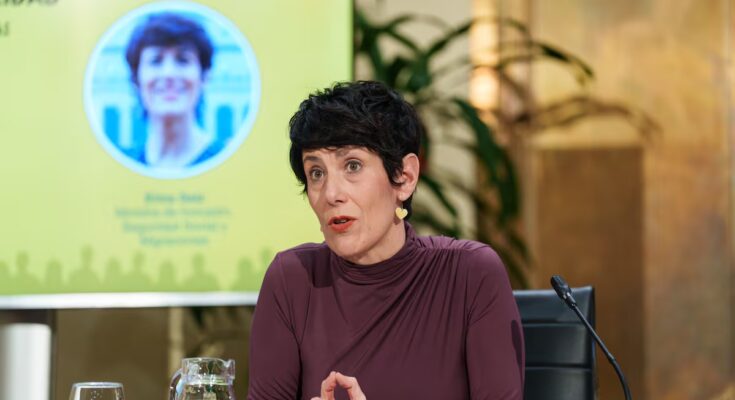Acceleration and braking. The negotiation to increase the quotas of self-employed workers began with intensity and then stopped. On the first day, October 13, Social Security proposed a large increase in contributions, a little higher in the lower brackets than in some intermediate brackets and even higher in the upper brackets. Neither the left nor the right liked it. Only a few days later, the minister of the sector, Elma Saiz, corrected this approach in an interview with EL PAÍS: while defending its convenience to reach the goal of contributing to real income in 2032, she slowed down the implementation of the system. At a meeting on October 20, the ministry proposed a freeze on the lowest fares and progressive below-inflation increases for the rest. Since then the ministry has not convened a formal meeting, but there have been comments from social workers and parliamentary groups that seem to dismiss the possibility of an agreement. If this pact is not reached, or if it is but the text brought to Parliament is not approved, Saiz herself admitted that the Government will have to extend the current quotas in 2026.
In this scenario, most of the associations representing self-employed workers in this negotiation (ATA, UPTA and Uatae) have complained about the dead end that the negotiations with Social Security have reached. “Moncloa has stopped all this,” says the source of an association, with which other organizations consulted also agree. In this sense, the general secretary of the Union of Self-employed Workers (Uatae), María José Landaburu, notes that the government is acting with a certain “paralysis and fear”, which she considers “inadmissible” and says she does not understand, “because there is still a lot of room for negotiation”.
Indeed, given the strong clash that occurred between the self-employed workers’ associations themselves and the social agents due to the two diametrically opposed proposals for increasing quotas, Landaburu and a representative of the social agents, who prefers not to identify themselves, agree that the Executive could unblock the conversations by addressing the improvement of protection. Specifically, the reduction of the conditions for access to compensation for cessation of business or, as the head of Uatae insists, the approval of unemployment compensation for self-employed workers over the age of 52.
However, the self-employed workers’ association ATA believes that reopening the negotiations to address the improvement of social protection would generate a conflict within the government itself, since the subsidy for those over 52 depends entirely on the Ministry of Labour, which, according to several sources, is totally against the extension of this aid to self-employed workers. In reality, ATA sources give a purely political interpretation of the stagnation of these negotiations: “The government knows that Junts will not approve anything regarding employment, much less increasing the quotas for self-employed workers. Furthermore, on December 21st there will be elections in Extremadura and I don’t think anyone wants to increase the quotas before that date”, they indicate.
For their part, union sources also acknowledge: “The order to interrupt the meeting may have come from Moncloa, but they are not right and it will cost them money in (European) funds”, since the implementation of the new contribution system for self-employed workers is one of the milestones that the government must reach in the EU recovery plan.
However, from the Ministry of Social Security they are more optimistic and assure that their latest proposal, with improvements in the group’s social protection, “is being studied and evaluated by the associations”. And, therefore, they appeal to the “responsibility” of these organizations and trust “that the proposal will be evaluated favorably and will continue to advance along the lines of what was agreed and voted on in 2022”, say sources in this department.
Among the associations there is also one that sees the agreement as more feasible than the others: Upta, which was the first to present its proposal to the ministry, developed together with the UGT. Its president, Eduardo Abad, stated: “Let’s give the necessary time, during this month of November, for (the Government) to be proactive; otherwise we will be proactive and promote an agreement whatever happens, because it would be an unacceptable disaster if the contributions were frozen in 2026. This would mean losing a pension for the future.”
In this way Abad suggests that, if the negotiations are not unblocked, Upta will try to convince the associations to reach some type of agreement. In reality, other sources already report the existence of discreet and bilateral contacts, in which the Executive would try to provide pedagogy in favor of the continuation of the implementation of the real income contribution system, which has now been called into question.
The PP, far from the Government
If the ministry manages to reach an unlikely agreement with social agents, given the circumstances described above, or decides to produce a text without the support of all or part of the organizations it is negotiating with, it will then have to face dialogue with the parliamentary groups. The positions expressed by each group suggest difficulties in reaching an agreement.
The main group in the Chamber, the PP, raised its flag against the quota increase proposed by the Government. It does so despite having supported the rule agreed in 2022, which established the start of the system that aspired to lead to real income contributions in 2032. The People’s Party not only reject the government’s approach, but have taken advantage of the rising decibels in the debate on self-employed workers to put forward their own proposal. This is a decalogue of measures that the president of the ATA particularly appreciated.
A possible turning point for the PP could depend on the position of this association of self-employed workers linked to the CEOE. Alberto Núñez Feijóo has demonstrated, in matters of labor and social security, that his party can support the Executive when the reforms have the full support of social dialogue. That is, when the government obtains not only the support of unions, but also that of employers. With this logic, the PP rejected the reduction of working hours, but supported the last part of the pension reform, both votes already with Feijóo at the helm.
Difficulty left and right
If the PP’s path does not prosper, the government would be in the hands of the investiture majority. And, like so many other times, in this scenario the Executive shows its head or its feet, given the difficulty of reconciling the vote of the most demanding parties on both sides: Junts on the right and Podemos on the left. The Catalan group believes that the latest Social Security proposal is “not enough” and that it simply consists of “maintaining the position” which, according to Junts, “impoverishes the Catalan middle class”, according to Miriam Nogueras on X (the old Twitter). This contrary position occurred before he slammed the door on the investiture pact made official by the bases of his party, which further distances possible support for the government.
The head of Podemos, Ione Belarra, is in favor of reducing quotas for those who earn less, instead of a freeze, and collecting more from those who earn more. “It is incomprehensible that those who earn less pay 30% in taxes and those who earn more pay only 8% or 10%,” he recently told Congress.
These two partners are the ones who give the Executive the most problems, but not even the most collaborative ones offer guarantees. The PNV did not appreciate the initial proposal and criticized the ministry’s communication strategy. “These announcements, ups and downs and contradictory messages only cause mistrust and uncertainty among many self-employed workers who already find it very difficult to make their way,” they argue in the parliamentary group.
The ERC celebrates the rectification of the Government’s initial proposal, but asks that the freezing of the lower quotas extend beyond 2026, while the BNG asks “that the quota in the highest brackets be increased more” and “less in those closest to the minimum wage”. Bildu did not respond to questions from this newspaper. Without an agreement, as Saiz explained in his interview with EL PAÍS, the current quotas would be extended.



